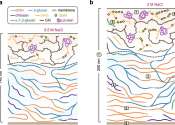Removing cesium: Solutions to a chemically complex problem
Fifty-six million gallons. That is the amount of radioactive tank waste left behind at the Hanford Site as a result of the secret government mission to provide the plutonium for the world's first atomic weapons and the Cold ...









